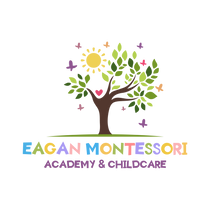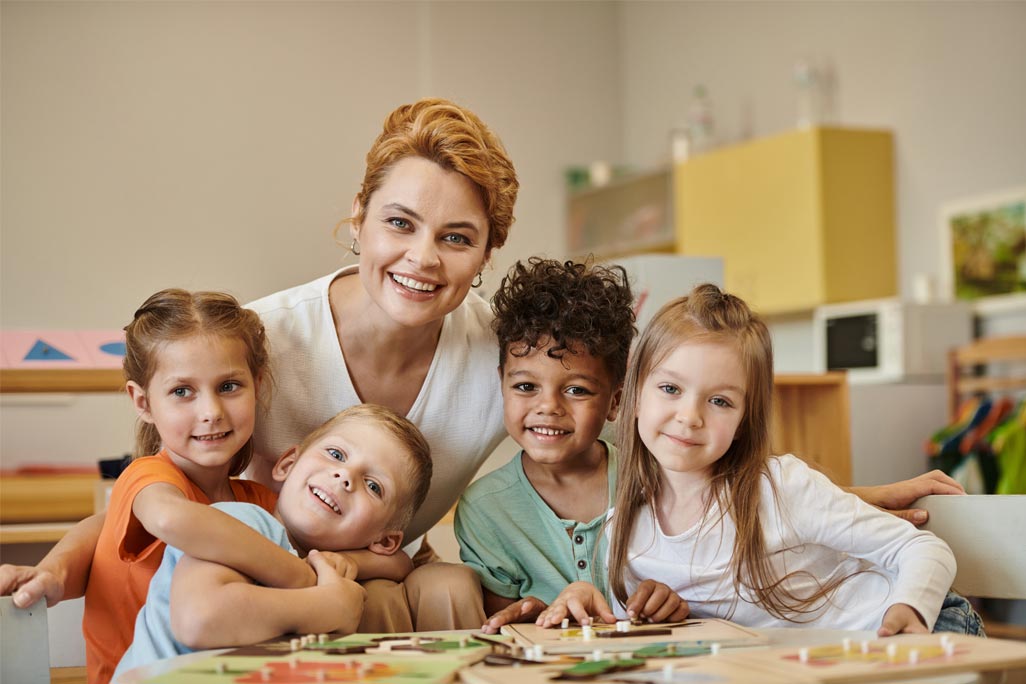FAQs
What is the difference between Montessori and Traditional education?
For children six and under, Montessori emphasizes learning through all five senses, not just through listening, watching, or reading. Children in Montessori classes learn at their own, individual pace and according to their own choice of activities from hundreds of possibilities. They are not required to sit and listen to a teacher talk to them as a group, but are engaged in individual or group activities of their own, with materials that have been introduced to them 1:1 by the teacher who knows what each child is ready to do. Learning is an exciting process of discovery, leading to concentration, motivation, self-discipline, and a love of learning.
Why does Montessori have multi-age classrooms?
Multi-age classrooms afford us the luxury of adapting the curriculum to the individual child. Each child can work at his or her own pace, while remaining in community with his or her peers. In addition, the multi-age format allows all older children to be the leaders of the classroom community – even those children who may be shy or quiet.
Is Montessori good for children with learning disabilities?
What about gifted children? Montessori is designed to help all children reach their fullest potential at their own unique pace. A classroom whose children have varying abilities is a community in which everyone learns from one another and everyone contributes. Moreover, multi-age grouping allows each child to find his or her own pace without feeling "ahead” or "behind” in relation to peers.
Are Montessori children successful later in life?
Research studies show that Montessori children are well prepared for later life academically, socially, and emotionally. In addition to scoring well on standardized tests, Montessori children are ranked above average on such criteria as following directions, turning in work on time, listening attentively, using basic skills, showing responsibility, asking provocative questions, showing enthusiasm for learning, and adapting to new situations.
Are Montessori schools religious?
No. Montessori educates children without reference to religious denomination. As a result, our classrooms are extremely diverse, with representation from all peoples, cultures and religions.
Is Montessori a franchise? Who can open a Montessori school?
The term Montessori is not trademarked and anyone, regardless of training, experience or affiliation can open a "Montessori” school. It is essential that parents researching Montessori act as good consumers to ensure the authenticity of their chosen program.
Isn’t Montessori just a preschool?
Montessori schools may be best known for their programs with young children, but the underlying educational method describes programs for students up through high school.
If children are free to choose their own work, how do you ensure that they receive a well-rounded education?
Montessori children are free to choose within limits, and have only as much freedom as they can handle with appropriate responsibility. The classroom teacher and assistant ensure that children do not interfere with each other, and that each child is progressing at her appropriate pace in all subjects.
Montessori classrooms don’t look like regular classrooms. Where are the rows of desks? Where does the teacher stand?
The different arrangement of a Montessori classroom mirrors the Montessori methods differences from traditional education. Rather than putting the teacher at the focal point of the class, with children dependent on her for information and activity, the classroom shows a literally child-centered approach. Children work at tables or on floor mats where they can spread out their materials, and the teacher circulates about the room, giving lessons or resolving issues as they arise.
Are Montessori schools as academically rigorous as traditional schools?
Yes; Montessori classrooms encourage deep learning of the concepts behind academic skills rather than rote practice of abstract techniques. The success of our students appears in the experiences of our alumni, who compete successfully with traditionally educated students in a variety of high schools and universities.
Since Montessori classrooms emphasize non-competitiveness, how are students adequately prepared for real-life competition later on?
Montessori classrooms emphasize competition with oneself: self-monitoring, self-correction, and a variety of other executive skills aimed at continuous improvement. Students typically become comfortable with their strengths and learn how to address their weaknesses. In older classes, students commonly participate in competitive activities with clear "winners” (auditions for limited opera roles, the annual spelling bee, etc.) in which students give their best performances while simultaneously encouraging peers to do the same. It is a healthy competition in which all contenders are content that they did their best in an environment with clear and consistent rules.

